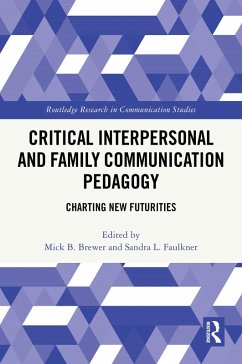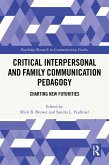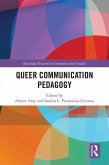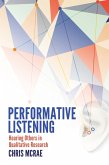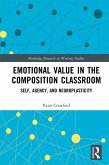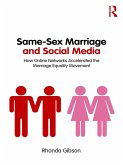Critical Interpersonal and Family Communication Pedagogy (eBook, PDF)
Charting New Futurities
Redaktion: Brewer, Mick B.; Faulkner, Sandra L.
44,95 €
44,95 €
inkl. MwSt.
Sofort per Download lieferbar

22 °P sammeln
44,95 €
Als Download kaufen

44,95 €
inkl. MwSt.
Sofort per Download lieferbar

22 °P sammeln
Jetzt verschenken
Alle Infos zum eBook verschenken
44,95 €
inkl. MwSt.
Sofort per Download lieferbar
Alle Infos zum eBook verschenken

22 °P sammeln
Critical Interpersonal and Family Communication Pedagogy (eBook, PDF)
Charting New Futurities
Redaktion: Brewer, Mick B.; Faulkner, Sandra L.
- Format: PDF
- Merkliste
- Auf die Merkliste
- Bewerten Bewerten
- Teilen
- Produkt teilen
- Produkterinnerung
- Produkterinnerung

Bitte loggen Sie sich zunächst in Ihr Kundenkonto ein oder registrieren Sie sich bei
bücher.de, um das eBook-Abo tolino select nutzen zu können.
Hier können Sie sich einloggen
Hier können Sie sich einloggen
Sie sind bereits eingeloggt. Klicken Sie auf 2. tolino select Abo, um fortzufahren.

Bitte loggen Sie sich zunächst in Ihr Kundenkonto ein oder registrieren Sie sich bei bücher.de, um das eBook-Abo tolino select nutzen zu können.
This volume establishes critical interpersonal and family pedagogy (CIFC) as a distinct academic area of inquiry, highlighting the intersections of identity, power, culture, pedagogy, and IFC concepts, theories, and methods.
- Geräte: PC
- mit Kopierschutz
- eBook Hilfe
Andere Kunden interessierten sich auch für
![Critical Interpersonal and Family Communication Pedagogy (eBook, ePUB) Critical Interpersonal and Family Communication Pedagogy (eBook, ePUB)]() Critical Interpersonal and Family Communication Pedagogy (eBook, ePUB)44,95 €
Critical Interpersonal and Family Communication Pedagogy (eBook, ePUB)44,95 €![Queer Communication Pedagogy (eBook, PDF) Queer Communication Pedagogy (eBook, PDF)]() Queer Communication Pedagogy (eBook, PDF)42,95 €
Queer Communication Pedagogy (eBook, PDF)42,95 €- -4%11
![Performative Listening (eBook, PDF) Performative Listening (eBook, PDF)]() Chris McraePerformative Listening (eBook, PDF)43,95 €
Chris McraePerformative Listening (eBook, PDF)43,95 € ![Natural Bridges in Interpersonal Communication (eBook, PDF) Natural Bridges in Interpersonal Communication (eBook, PDF)]() Randy FujishinNatural Bridges in Interpersonal Communication (eBook, PDF)46,95 €
Randy FujishinNatural Bridges in Interpersonal Communication (eBook, PDF)46,95 €![Emotional Value in the Composition Classroom (eBook, PDF) Emotional Value in the Composition Classroom (eBook, PDF)]() Ryan CrawfordEmotional Value in the Composition Classroom (eBook, PDF)42,95 €
Ryan CrawfordEmotional Value in the Composition Classroom (eBook, PDF)42,95 €![Digital Reading of Net Generation in China (eBook, PDF) Digital Reading of Net Generation in China (eBook, PDF)]() Han ZhangDigital Reading of Net Generation in China (eBook, PDF)42,95 €
Han ZhangDigital Reading of Net Generation in China (eBook, PDF)42,95 €![Same-Sex Marriage and Social Media (eBook, PDF) Same-Sex Marriage and Social Media (eBook, PDF)]() Rhonda GibsonSame-Sex Marriage and Social Media (eBook, PDF)40,95 €
Rhonda GibsonSame-Sex Marriage and Social Media (eBook, PDF)40,95 €-
-
-
This volume establishes critical interpersonal and family pedagogy (CIFC) as a distinct academic area of inquiry, highlighting the intersections of identity, power, culture, pedagogy, and IFC concepts, theories, and methods.
Dieser Download kann aus rechtlichen Gründen nur mit Rechnungsadresse in A, B, BG, CY, CZ, D, DK, EW, E, FIN, F, GR, HR, H, IRL, I, LT, L, LR, M, NL, PL, P, R, S, SLO, SK ausgeliefert werden.
Produktdetails
- Produktdetails
- Verlag: Taylor & Francis eBooks
- Seitenzahl: 278
- Erscheinungstermin: 20. Dezember 2024
- Englisch
- ISBN-13: 9781040257555
- Artikelnr.: 72314328
- Verlag: Taylor & Francis eBooks
- Seitenzahl: 278
- Erscheinungstermin: 20. Dezember 2024
- Englisch
- ISBN-13: 9781040257555
- Artikelnr.: 72314328
- Herstellerkennzeichnung Die Herstellerinformationen sind derzeit nicht verfügbar.
Mick B. Brewer (Ph.D., Southern Illinois University Carbondale) is Assistant Professor of Communication Studies at Lincoln University of Missouri. His research is situated within the critical tradition and spans various communication subfields including interpersonal communication, critical media studies, sexuality studies, and communication education, and has been published in multiple edited volumes and academic journals including Journal of Social and Personal Relationships, Critical Studies in Media Communication, Communication, Culture, & Critique, and Sexuality & Culture. Sandra L. Faulkner (Ph.D., The Pennsylvania State University) is Professor of Media and Communication at Bowling Green State University where she writes, teaches, and researches about close relationships. Faulkner's interests include qualitative methodology, poetic inquiry, inclusive pedagogy, and critical perspectives on interpersonal and family communication. She engages in community-based research focusing on aging and communication across the life course and uses poetry as a form of social justice and activism. Faulkner is Editor of Communication Studies (2025-2027)
Introduction
Section One. Activating the Bridgework: Coupling Interpersonal and Family
Communication Research with Criticality.
Chapter 1: Towards a Pedagogy of Suspicion: Inaugurating the Promising
Entanglement of CIFC and Critical Communication Pedagogy
Chapter 2: Cultivating Change: An Introduction and Invitation to Critical
Interpersonal and Family Communication Pedagogy
Chapter 3: On Being Sex Affirming: Advocating Progressive Sexual Ideals and
Practices
Chapter 4: (Re)Introducing Graduate Interpersonal Communication: Reifying
new traditions through attending to who is next
Chapter 5: Critical Interpersonal and Family Communication Pedagogy:
Reflecting, Questioning, and Re-Constructing Assumptions about Gender and
Sexuality in the Classroom
Chapter 6: A Critical Race Counterstory of Teaching and Learning
Interpersonal and Family Communication
Chapter 7: Challenging Dualisms in CIFC Traditions: Journeys to Critical
Praxis
Section Two: Praxiological Criticality: Applying the CIFC Framework in the
Classroom.
Chapter 8: Crystalizing, Quilting, and Running for Queen and Community:
Practicing Anti-Transcarceral Grief Pedagogy Following a Loss by Suicide
Chapter 9: Intergenerational Connections: An online community engagement
project
Chapter 10: Cultivating Empathy and Transformation at the Intersections: A
CIFC Teaching Activity
Chapter 11: #Thatsfamily: Interrogating Family Discourses and Politics
Through Social Media
Chapter 12: Transforming the Paradigm of Aging: Community Engaged Learning
and Critical Interpersonal and Family Communication Pedagogy
Chapter 13: Disrupting Master Narratives Through Intersectional Reflexivity
in the Interpersonal Communication Classroom
Section Three: Ruminations from the Front Lines: Reflecting on and
Confronting Power in and Around the IFC Classroom.
Chapter 14: Performing Female: Using Communication Accommodation Theory to
Critically Interrogate Gender Identity Salience in Classroom Encounters
Chapter 15: Life in the Learning Zone: Student Engagement Through a
Pedagogy of the Taboo
Chapter 16: "It's All in the Family": BIPOC Professors, Critical
Interpersonal Family Communication (CIFC), and Students' Personal Histories
in the Diversity Classroom
Chapter 17: Reconciling Difficult Classroom Conversations with Reflexivity,
Dialogue, and Vulnerability
Section One. Activating the Bridgework: Coupling Interpersonal and Family
Communication Research with Criticality.
Chapter 1: Towards a Pedagogy of Suspicion: Inaugurating the Promising
Entanglement of CIFC and Critical Communication Pedagogy
Chapter 2: Cultivating Change: An Introduction and Invitation to Critical
Interpersonal and Family Communication Pedagogy
Chapter 3: On Being Sex Affirming: Advocating Progressive Sexual Ideals and
Practices
Chapter 4: (Re)Introducing Graduate Interpersonal Communication: Reifying
new traditions through attending to who is next
Chapter 5: Critical Interpersonal and Family Communication Pedagogy:
Reflecting, Questioning, and Re-Constructing Assumptions about Gender and
Sexuality in the Classroom
Chapter 6: A Critical Race Counterstory of Teaching and Learning
Interpersonal and Family Communication
Chapter 7: Challenging Dualisms in CIFC Traditions: Journeys to Critical
Praxis
Section Two: Praxiological Criticality: Applying the CIFC Framework in the
Classroom.
Chapter 8: Crystalizing, Quilting, and Running for Queen and Community:
Practicing Anti-Transcarceral Grief Pedagogy Following a Loss by Suicide
Chapter 9: Intergenerational Connections: An online community engagement
project
Chapter 10: Cultivating Empathy and Transformation at the Intersections: A
CIFC Teaching Activity
Chapter 11: #Thatsfamily: Interrogating Family Discourses and Politics
Through Social Media
Chapter 12: Transforming the Paradigm of Aging: Community Engaged Learning
and Critical Interpersonal and Family Communication Pedagogy
Chapter 13: Disrupting Master Narratives Through Intersectional Reflexivity
in the Interpersonal Communication Classroom
Section Three: Ruminations from the Front Lines: Reflecting on and
Confronting Power in and Around the IFC Classroom.
Chapter 14: Performing Female: Using Communication Accommodation Theory to
Critically Interrogate Gender Identity Salience in Classroom Encounters
Chapter 15: Life in the Learning Zone: Student Engagement Through a
Pedagogy of the Taboo
Chapter 16: "It's All in the Family": BIPOC Professors, Critical
Interpersonal Family Communication (CIFC), and Students' Personal Histories
in the Diversity Classroom
Chapter 17: Reconciling Difficult Classroom Conversations with Reflexivity,
Dialogue, and Vulnerability
Introduction
Section One. Activating the Bridgework: Coupling Interpersonal and Family
Communication Research with Criticality.
Chapter 1: Towards a Pedagogy of Suspicion: Inaugurating the Promising
Entanglement of CIFC and Critical Communication Pedagogy
Chapter 2: Cultivating Change: An Introduction and Invitation to Critical
Interpersonal and Family Communication Pedagogy
Chapter 3: On Being Sex Affirming: Advocating Progressive Sexual Ideals and
Practices
Chapter 4: (Re)Introducing Graduate Interpersonal Communication: Reifying
new traditions through attending to who is next
Chapter 5: Critical Interpersonal and Family Communication Pedagogy:
Reflecting, Questioning, and Re-Constructing Assumptions about Gender and
Sexuality in the Classroom
Chapter 6: A Critical Race Counterstory of Teaching and Learning
Interpersonal and Family Communication
Chapter 7: Challenging Dualisms in CIFC Traditions: Journeys to Critical
Praxis
Section Two: Praxiological Criticality: Applying the CIFC Framework in the
Classroom.
Chapter 8: Crystalizing, Quilting, and Running for Queen and Community:
Practicing Anti-Transcarceral Grief Pedagogy Following a Loss by Suicide
Chapter 9: Intergenerational Connections: An online community engagement
project
Chapter 10: Cultivating Empathy and Transformation at the Intersections: A
CIFC Teaching Activity
Chapter 11: #Thatsfamily: Interrogating Family Discourses and Politics
Through Social Media
Chapter 12: Transforming the Paradigm of Aging: Community Engaged Learning
and Critical Interpersonal and Family Communication Pedagogy
Chapter 13: Disrupting Master Narratives Through Intersectional Reflexivity
in the Interpersonal Communication Classroom
Section Three: Ruminations from the Front Lines: Reflecting on and
Confronting Power in and Around the IFC Classroom.
Chapter 14: Performing Female: Using Communication Accommodation Theory to
Critically Interrogate Gender Identity Salience in Classroom Encounters
Chapter 15: Life in the Learning Zone: Student Engagement Through a
Pedagogy of the Taboo
Chapter 16: "It's All in the Family": BIPOC Professors, Critical
Interpersonal Family Communication (CIFC), and Students' Personal Histories
in the Diversity Classroom
Chapter 17: Reconciling Difficult Classroom Conversations with Reflexivity,
Dialogue, and Vulnerability
Section One. Activating the Bridgework: Coupling Interpersonal and Family
Communication Research with Criticality.
Chapter 1: Towards a Pedagogy of Suspicion: Inaugurating the Promising
Entanglement of CIFC and Critical Communication Pedagogy
Chapter 2: Cultivating Change: An Introduction and Invitation to Critical
Interpersonal and Family Communication Pedagogy
Chapter 3: On Being Sex Affirming: Advocating Progressive Sexual Ideals and
Practices
Chapter 4: (Re)Introducing Graduate Interpersonal Communication: Reifying
new traditions through attending to who is next
Chapter 5: Critical Interpersonal and Family Communication Pedagogy:
Reflecting, Questioning, and Re-Constructing Assumptions about Gender and
Sexuality in the Classroom
Chapter 6: A Critical Race Counterstory of Teaching and Learning
Interpersonal and Family Communication
Chapter 7: Challenging Dualisms in CIFC Traditions: Journeys to Critical
Praxis
Section Two: Praxiological Criticality: Applying the CIFC Framework in the
Classroom.
Chapter 8: Crystalizing, Quilting, and Running for Queen and Community:
Practicing Anti-Transcarceral Grief Pedagogy Following a Loss by Suicide
Chapter 9: Intergenerational Connections: An online community engagement
project
Chapter 10: Cultivating Empathy and Transformation at the Intersections: A
CIFC Teaching Activity
Chapter 11: #Thatsfamily: Interrogating Family Discourses and Politics
Through Social Media
Chapter 12: Transforming the Paradigm of Aging: Community Engaged Learning
and Critical Interpersonal and Family Communication Pedagogy
Chapter 13: Disrupting Master Narratives Through Intersectional Reflexivity
in the Interpersonal Communication Classroom
Section Three: Ruminations from the Front Lines: Reflecting on and
Confronting Power in and Around the IFC Classroom.
Chapter 14: Performing Female: Using Communication Accommodation Theory to
Critically Interrogate Gender Identity Salience in Classroom Encounters
Chapter 15: Life in the Learning Zone: Student Engagement Through a
Pedagogy of the Taboo
Chapter 16: "It's All in the Family": BIPOC Professors, Critical
Interpersonal Family Communication (CIFC), and Students' Personal Histories
in the Diversity Classroom
Chapter 17: Reconciling Difficult Classroom Conversations with Reflexivity,
Dialogue, and Vulnerability
